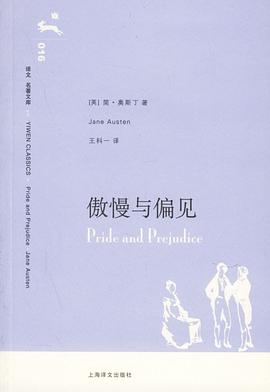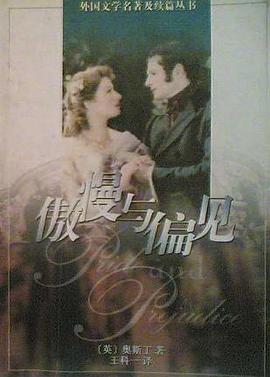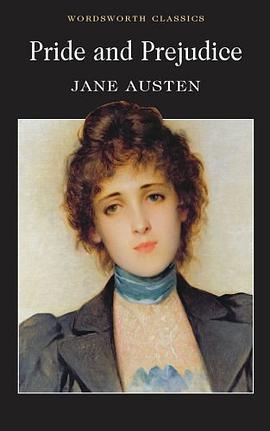+奥斯丁
傲慢与偏见 豆瓣
Pride and Prejudice
8.6 (62 个评分)
作者:
[英国] 简·奥斯汀
译者:
王科一
上海译文出版社
1996
《傲慢与偏见》是英国著名女作家简·奥斯汀(Jane Austen 1775~1817年)的代表作,是一部描写爱情与婚姻的小说。这部小说以男女主人公达西和伊丽莎白由于傲慢和偏见而产生的爱情纠葛为线索,共写了四起姻缘:伊丽莎白与达西、简与宾利、莉迪亚与威克姆、夏洛蒂与柯林斯。伊丽莎白、简和莉迪亚是贝内特家五个女儿中的三个姐妹,而夏洛蒂则是她们的邻居,也是伊丽莎白的朋友。男主人公达西与宾利是好友,且与威克姆一起长大,而柯林斯则是贝内特家的远房亲戚。
贝内特夫妇五个女儿待字闺中,没有子嗣,依照当时法律,他们死后家产须由远房内侄柯林斯继承,因此把五个女儿嫁到有钱人家,成了贝内特太太最大的心愿。宾利,一位未婚富家子弟,租赁了贝内特家附近的内瑟菲尔德庄园,成为众人注目的焦点和谈论的话题。不久,宾利就与美丽贤淑的大小姐简相爱了。宾利的朋友达西对聪明直率的二小姐伊丽莎白颇有好感,却因在一次舞会上出言不逊使伊丽莎白对他心存偏见。品行不端的威克姆告诉伊丽莎白,他是达西庄园已故总管的儿子,与达西一起长大,达西的父亲先前许诺给他的教职,被达西无端剥夺了。而达西则因为伊丽莎白的母亲及其他妹妹的缘故,劝说宾利中止与简的关系,结果四人不欢而散。威克姆对达西的诋毁,以及达西的劝说对简造成的伤害进一步加深了伊丽莎白对达西的偏见。
柯林斯为心安理得地继承财产,决定从贝内特家五个漂亮的女儿之中挑选一个“妻子”,于是向伊丽莎白求婚。遭到拒绝后,他马上转向尚未婚配急于找到“归宿”的夏洛蒂小姐,竟然得到应允。伊丽莎白应邀到新婚的柯林斯和夏洛蒂夫妇家中做客,不期遇见前来探望凯瑟琳夫人的达西。达西为伊丽莎白所倾倒,向她求婚,但因其言辞的傲慢,遭到伊丽莎白的愤然拒绝。同时,伊丽莎白指责达西对威克姆冷酷无情,更不应该破坏宾利同简的爱情。事后达西写信为自己申辩,令伊丽莎白的偏见逐渐消除。
伊丽莎白随舅父舅妈出游时经过达西的庄园,以为达西不在,进去参观,不料达西突然归来,伊丽莎白感到十分窘迫。然而,达西丝毫没有以往的傲慢,非常热情地接待了他们。此时,伊丽莎白突然接到家信,得知威克姆带着妹妹莉迪亚私奔了!匆忙回家后,全家一筹莫展,不料达西暗访到两人的行踪,出资促成他们的婚事并安排了他们的生活,为贝内特一家保全了尊严。此事使伊丽莎白与达西尽释前嫌,宾利也和简重修旧好,最后有情人终成眷属。
贝内特夫妇五个女儿待字闺中,没有子嗣,依照当时法律,他们死后家产须由远房内侄柯林斯继承,因此把五个女儿嫁到有钱人家,成了贝内特太太最大的心愿。宾利,一位未婚富家子弟,租赁了贝内特家附近的内瑟菲尔德庄园,成为众人注目的焦点和谈论的话题。不久,宾利就与美丽贤淑的大小姐简相爱了。宾利的朋友达西对聪明直率的二小姐伊丽莎白颇有好感,却因在一次舞会上出言不逊使伊丽莎白对他心存偏见。品行不端的威克姆告诉伊丽莎白,他是达西庄园已故总管的儿子,与达西一起长大,达西的父亲先前许诺给他的教职,被达西无端剥夺了。而达西则因为伊丽莎白的母亲及其他妹妹的缘故,劝说宾利中止与简的关系,结果四人不欢而散。威克姆对达西的诋毁,以及达西的劝说对简造成的伤害进一步加深了伊丽莎白对达西的偏见。
柯林斯为心安理得地继承财产,决定从贝内特家五个漂亮的女儿之中挑选一个“妻子”,于是向伊丽莎白求婚。遭到拒绝后,他马上转向尚未婚配急于找到“归宿”的夏洛蒂小姐,竟然得到应允。伊丽莎白应邀到新婚的柯林斯和夏洛蒂夫妇家中做客,不期遇见前来探望凯瑟琳夫人的达西。达西为伊丽莎白所倾倒,向她求婚,但因其言辞的傲慢,遭到伊丽莎白的愤然拒绝。同时,伊丽莎白指责达西对威克姆冷酷无情,更不应该破坏宾利同简的爱情。事后达西写信为自己申辩,令伊丽莎白的偏见逐渐消除。
伊丽莎白随舅父舅妈出游时经过达西的庄园,以为达西不在,进去参观,不料达西突然归来,伊丽莎白感到十分窘迫。然而,达西丝毫没有以往的傲慢,非常热情地接待了他们。此时,伊丽莎白突然接到家信,得知威克姆带着妹妹莉迪亚私奔了!匆忙回家后,全家一筹莫展,不料达西暗访到两人的行踪,出资促成他们的婚事并安排了他们的生活,为贝内特一家保全了尊严。此事使伊丽莎白与达西尽释前嫌,宾利也和简重修旧好,最后有情人终成眷属。
Pride and Prejudice 豆瓣
作者:
Jane Austen
/
Introduction by Ian Littlewood
Wordsworth Editions Ltd
1995
- 9
《傲慢与偏见》主讲了奥斯丁的讽刺艺术,不仅表现在某些人物的喜剧性格上,也不仅表现在众多情节的喜剧性处理上,而且还融汇在整个故事的反讽构思中,让现实对人们的主观臆想进行嘲讽。男主角达西最初断定,贝内特家有那么多不利因素,几个女儿很难找到有地位的男人,可后来恰恰是他娶了伊丽莎白。而伊丽莎白呢,她曾发誓决不嫁给达西,可最后还是由她做了达西夫人。再看看那个不可一世的凯瑟琳·德布尔夫人,为了阻止伊丽莎白与她外甥达西攀亲,她不辞辛劳,亲自出马,先是跑来威吓伊丽莎白,继而跑去训诫达西,殊不知正是她这次奔走为两位默默相恋的青年通了信息,促成了他们的美满结合。更令人啼笑皆非的是,就在这几位“智者”受到现实嘲弄的同时,书中那位最可笑的“愚人”贝内特太太,最后却被证明是最正确的。她认为:“有钱的单身汉总要娶位太太,这是一条举世公认的真理。”这种荒谬与“真理”的滑稽转化,尽管超越了一般意义上的是非观念,但却体现了作者对生活的深刻思索。
It is a truth universally acknowledged, that a single man in possession of a good fortune, must be in want of a wife."Next to the exhortation at the beginning of Moby-Dick, "Call me Ishmael," the first sentence of Jane Austen's Pride and Prejudice must be among the most quoted in literature. And certainly what Melville did for whaling Austen does for marriage——tracing the intricacies (not to mention the economics) of 19th-century British mating rituals with a sure hand and an unblinking eye. As usual, Austen trains her sights on a country village and a few families——in this case, the Bennets, the Philips, and the Lucases. Into their midst comes Mr. Bingley, a single man of good fortune, and his friend, Mr. Darcy, who is even richer. Mrs. Bennet, who married above her station, sees their arrival as an opportunity to marry off at least one of her five daughters. Bingley is complaisant and easily charmed by the eldest Bennet girl, Jane; Darcy, however, is harder to please. Put off by Mrs. Bennet's vulgarity and the untoward behavior of the three younger daughters, he is unable to see the true worth of the older girls, Jane and Elizabeth. His excessive pride offends Lizzy, who is more than willing to believe the worst that other people have to say of him; when George Wickham, a soldier stationed in the village, does indeed have a discreditable tale to tell, his words fall on fertile ground.
Having set up the central misunderstanding of the novel, Austen then brings in her cast of fascinating secondary characters: Mr. Collins, the sycophantic clergyman who aspires to Lizzy's hand but settles for her best friend, Charlotte, instead; Lady Catherine de Bourgh, Mr. Darcy's insufferably snobbish aunt; and the Gardiners, Jane and Elizabeth's low-born but noble-hearted aunt and uncle. Some of Austen's best comedy comes from mixing and matching these representatives of different classes and economic strata, demonstrating the hypocrisy at the heart of so many social interactions. And though the novel is rife with romantic misunderstandings, rejected proposals, disastrous elopements, and a requisite happy ending for those who deserve one, Austen never gets so carried away with the romance that she loses sight of the hard economic realities of 19th-century matrimonial maneuvering. Good marriages for penniless girls such as the Bennets are hard to come by, and even Lizzy, who comes to sincerely value Mr. Darcy, remarks when asked when she first began to love him: "It has been coming on so gradually, that I hardly know when it began. But I believe I must date it from my first seeing his beautiful grounds at Pemberley." She may be joking, but there's more than a little truth to her sentiment, as well. Jane Austen considered Elizabeth Bennet "as delightful a creature as ever appeared in print". Readers of Pride and Prejudice would be hard-pressed to disagree. ——Alix Wilber
点击链接进入中文版:
傲慢与偏见
It is a truth universally acknowledged, that a single man in possession of a good fortune, must be in want of a wife."Next to the exhortation at the beginning of Moby-Dick, "Call me Ishmael," the first sentence of Jane Austen's Pride and Prejudice must be among the most quoted in literature. And certainly what Melville did for whaling Austen does for marriage——tracing the intricacies (not to mention the economics) of 19th-century British mating rituals with a sure hand and an unblinking eye. As usual, Austen trains her sights on a country village and a few families——in this case, the Bennets, the Philips, and the Lucases. Into their midst comes Mr. Bingley, a single man of good fortune, and his friend, Mr. Darcy, who is even richer. Mrs. Bennet, who married above her station, sees their arrival as an opportunity to marry off at least one of her five daughters. Bingley is complaisant and easily charmed by the eldest Bennet girl, Jane; Darcy, however, is harder to please. Put off by Mrs. Bennet's vulgarity and the untoward behavior of the three younger daughters, he is unable to see the true worth of the older girls, Jane and Elizabeth. His excessive pride offends Lizzy, who is more than willing to believe the worst that other people have to say of him; when George Wickham, a soldier stationed in the village, does indeed have a discreditable tale to tell, his words fall on fertile ground.
Having set up the central misunderstanding of the novel, Austen then brings in her cast of fascinating secondary characters: Mr. Collins, the sycophantic clergyman who aspires to Lizzy's hand but settles for her best friend, Charlotte, instead; Lady Catherine de Bourgh, Mr. Darcy's insufferably snobbish aunt; and the Gardiners, Jane and Elizabeth's low-born but noble-hearted aunt and uncle. Some of Austen's best comedy comes from mixing and matching these representatives of different classes and economic strata, demonstrating the hypocrisy at the heart of so many social interactions. And though the novel is rife with romantic misunderstandings, rejected proposals, disastrous elopements, and a requisite happy ending for those who deserve one, Austen never gets so carried away with the romance that she loses sight of the hard economic realities of 19th-century matrimonial maneuvering. Good marriages for penniless girls such as the Bennets are hard to come by, and even Lizzy, who comes to sincerely value Mr. Darcy, remarks when asked when she first began to love him: "It has been coming on so gradually, that I hardly know when it began. But I believe I must date it from my first seeing his beautiful grounds at Pemberley." She may be joking, but there's more than a little truth to her sentiment, as well. Jane Austen considered Elizabeth Bennet "as delightful a creature as ever appeared in print". Readers of Pride and Prejudice would be hard-pressed to disagree. ——Alix Wilber
点击链接进入中文版:
傲慢与偏见


